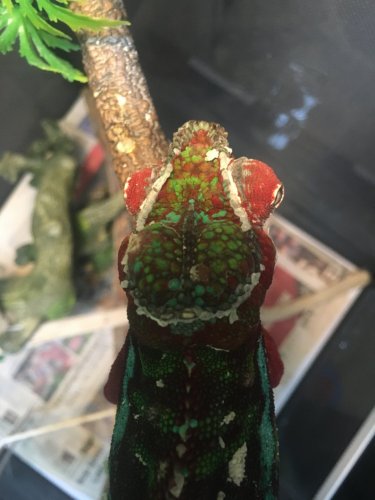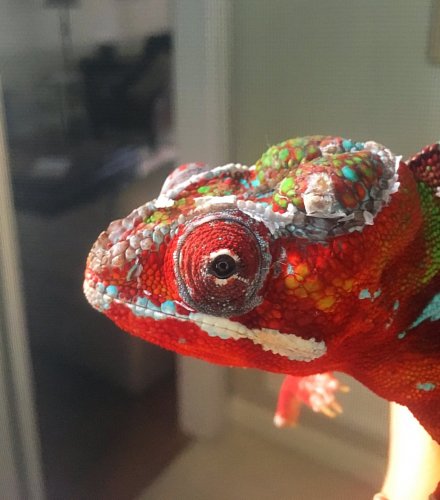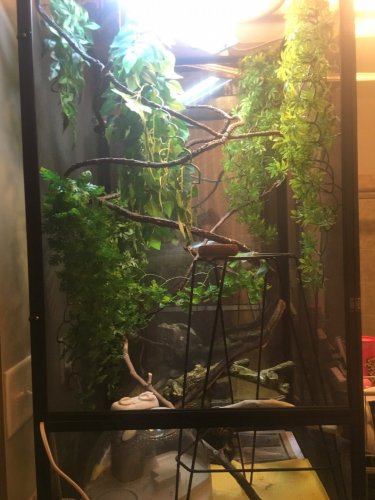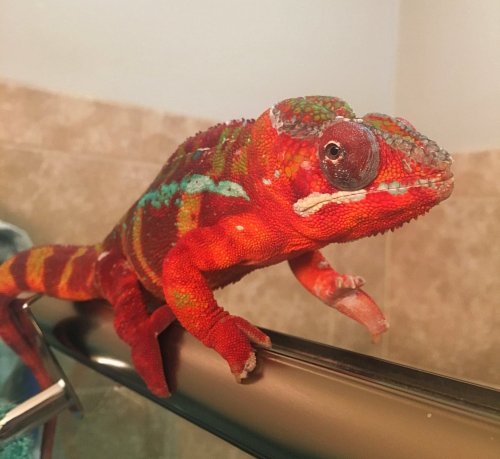ahood
Member
Chameleon Info:
Cage Info:
Current Problem - My chameleon, Kiwi, has been having issues with his eyes for the past couple months. At first it was just one eye. He began keeping it closed much of the time and his pupil is very small in this eye. He also keeps it sucked in most of the time. He then began closing his other eye while in the cage, appearing as if he is sleeping (but I know he's not) The appearance of the other eye has remained normal (color, pupil size, etc, hasn't changed) I know his eyes are irritating him, because he tries to rub them on various items in his cage. He also rolls them a lot. I have taken him to a good vet in Raleigh, NC: Dr. Dan Johnson at Avian and Exotic Animal Care. First, we tried an antibiotic and anti-inflammatory. I administered the eye drops in his eyes as instructed: 3 times a day for 2 weeks. The drops had no effect. We then gave him a shot of Vitamin A and I changed his multivitamin to a multivitamin with active Vitamin A in it. We added another antibiotic by mouth (for a skin issue). The skin has drastically improved, but still no improvement on his eyes. I don't know what else to do. I've already spent $400 at the vet. Maybe go back and do an eye culture? I'm out of ideas and feel like the vets are too. He is eating and drinking normally so I wouldn't be as concerned about it, if it weren't for the fact that I know they are irritating him badly since he always tries to rub them on the vines in his cage.
- Your Chameleon - Ambilobe Panther Chameleon, male, almost three years old, has been in my care entire life
- Handling - handle about every other day
- Feeding - feed phoenix worms, dubia roaches, and superworms. Amount varies: sometimes eats 15 insects a day, sometimes 5. There is no schedule. He has food constantly available. I gutload with carrots.
- Supplements - I dust all insects everyday with Rep Cal Calcium (no phosphorus, no D3), and dust half of meal 1-2 times a week with Zoo Med's Reptivite.
- Watering - There is a humidifier in the cage that runs for two hours at a time all day long (distilled water). I offer water multiple times a day with a syringe.
- Fecal Description - Droppings are moist w/white and sometimes light/faint orange tint. Never been tested for parasites.
- History - Got MBD when he was little and broke a leg. I corrected this immediately and haven't had a problem with it since.
Cage Info:
- Cage Type - Reptibreeze XL: all screen 24X48X48
- Lighting - Arcadia D3 6% T8 Reptile Lamp 24" and a 100W ZOO MED PowerSun lights are on for 13 hours per day
- Temperature - Temps in cage range from 77 degrees F (cage floor) to 91 degrees F (highest basking spot). The lowest temp at night is 74 degrees F and these temps are measured with a Zilla clicker digital thermometer
- Humidity - I have a humidifier running every two hours all day and off at night. I don't actually have a humidity gage in the cage at the moment. I need to get one. My guess is that the humidity ranges from 70%-80% during the day and is at 50% at night.
- Plants - I do not have any live plants in the cage.
- Placement - The cage is now located in my bathroom on the counter. The top of the cage is probably about 7ft from the room floor.
- Location - North Carolina
Current Problem - My chameleon, Kiwi, has been having issues with his eyes for the past couple months. At first it was just one eye. He began keeping it closed much of the time and his pupil is very small in this eye. He also keeps it sucked in most of the time. He then began closing his other eye while in the cage, appearing as if he is sleeping (but I know he's not) The appearance of the other eye has remained normal (color, pupil size, etc, hasn't changed) I know his eyes are irritating him, because he tries to rub them on various items in his cage. He also rolls them a lot. I have taken him to a good vet in Raleigh, NC: Dr. Dan Johnson at Avian and Exotic Animal Care. First, we tried an antibiotic and anti-inflammatory. I administered the eye drops in his eyes as instructed: 3 times a day for 2 weeks. The drops had no effect. We then gave him a shot of Vitamin A and I changed his multivitamin to a multivitamin with active Vitamin A in it. We added another antibiotic by mouth (for a skin issue). The skin has drastically improved, but still no improvement on his eyes. I don't know what else to do. I've already spent $400 at the vet. Maybe go back and do an eye culture? I'm out of ideas and feel like the vets are too. He is eating and drinking normally so I wouldn't be as concerned about it, if it weren't for the fact that I know they are irritating him badly since he always tries to rub them on the vines in his cage.







